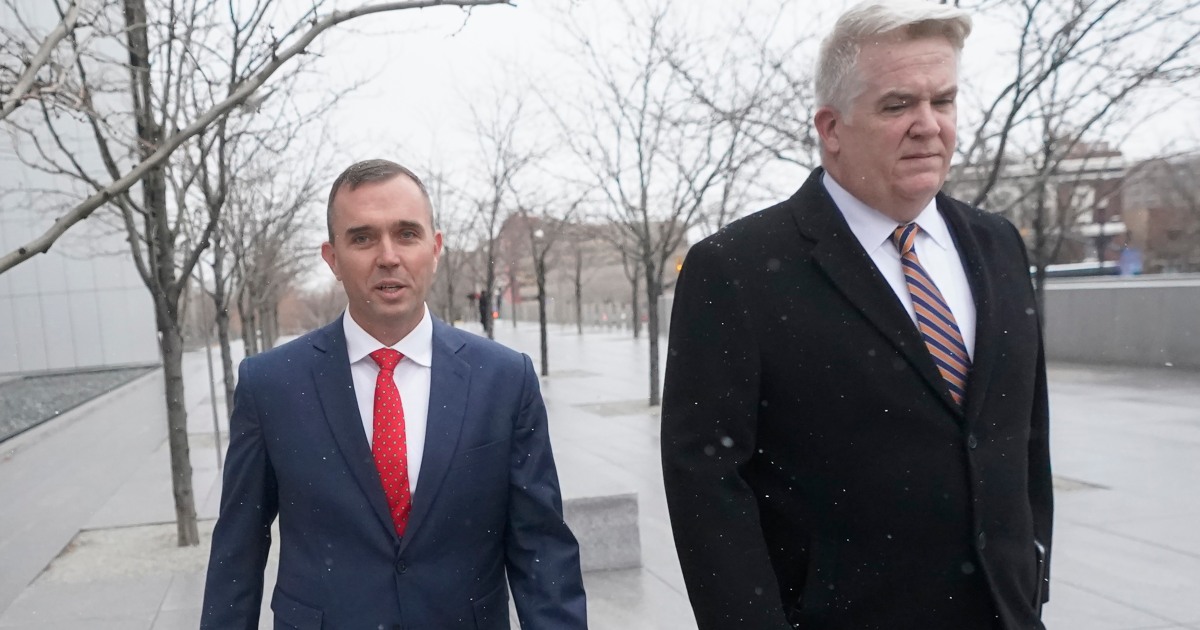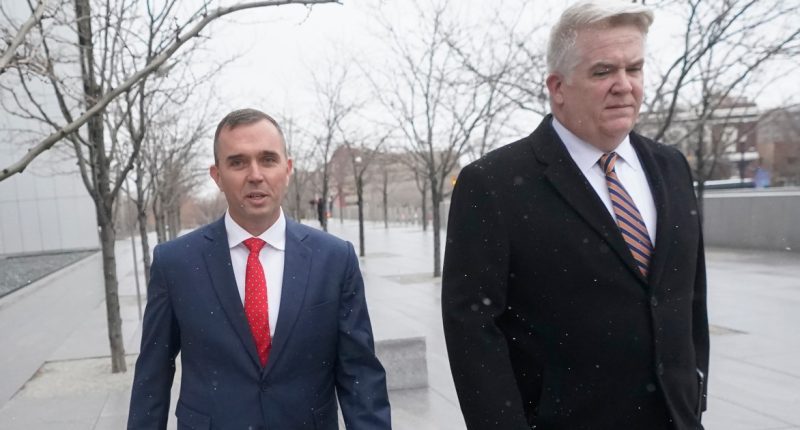
SALT LAKE CITY — Attorneys clashed Thursday in a Utah courtroom over opposing characterizations of a fight between two commercial airline pilots in which the co-pilot allegedly threatened to shoot the captain for suggesting they divert the flight for a passenger’s medical emergency.
Former Delta Air Lines pilot Jonathan J. Dunn, 42, made his first federal court appearance Thursday in Salt Lake City after he was indicted by a grand jury on Oct. 18, 2023, and charged with interfering with a flight crew. His lawyer, John W. Huber, who was once Utah’s top federal prosecutor, tried to characterize the altercation as “a misunderstanding,” while prosecutors described it as a “grave offense.”
The heated argument had erupted in the cockpit of a 2022 flight from Atlanta to Salt Lake City, on which Dunn was the first officer, or co-pilot.
The captain, who is not named in court documents, had proposed diverting their commercial flight to Grand Junction, Colorado, if the passenger’s condition worsened, the U.S. Attorney’s Office alleges. Dunn objected and threatened multiple times to shoot the captain, whom he accused of “going crazy,” the documents state.
If convicted, Dunn could face up to 20 years in prison. Judge Jared C. Bennett set his trial date for March 12.
Dunn acknowledged threatening the captain but said his remarks were intended as a joke, according to new court documents detailing the altercation. The captain did not perceive the threats as a joke and told authorities that he was concerned Dunn would use his firearm to “relieve” him of command of the aircraft.
Huber, Dunn’s attorney, argued Thursday that he should not be considered dangerous, reminding the judge that his client has no criminal history.
The new court documents reveal that Dunn seemed to recognize the gravity of his actions, telling Delta officials, “This could have been much worse. In hindsight if I had been threatened, I would not be able to operate.”
Dunn, of Rapid City, South Dakota, had been authorized by the Transportation Security Administration to carry a firearm on board. The TSA has since revoked that authority, and Delta says Dunn no longer works for the airline.
The program authorizing some pilots to carry guns on domestic flights emerged as an security measure after the terrorist attacks on Sept. 11, 2001, said Ross Aimer, an aviation expert and the CEO of Aero Consulting Experts. After the government realized it would be too expensive to have an air marshal on every flight, it allowed pilots such as Dunn to volunteer for a training program to become federal flight deck officers.
Participating pilots must be vetted and attend a training course at a federal law enforcement center in New Mexico before they’re authorized to carry a gun on board, according to the TSA. And all pilots undergo regular medical exams in which they’re required to disclose whether they have depression or anxiety, as well as their use of medications, drugs and alcohol.
“There are extensive protocols attached to how you carry this weapon,” Aimer said of the officers’ training. “You’re not supposed to take it out of the cockpit, or even out of the holster, unless it’s absolutely necessary.”
All commercial pilots receive training on how to calmly settle disagreements and are required to immediately report if a colleague is showing signs of any concerning behavior, he said.
The altercation occurred on the last leg of a three-day cross-country rotation that Dunn and the captain completed together. The captain reported having problems with Dunn questioning his decisions throughout the entire rotation and attempting to be, what he called a “right-seat captain.”
Dunn is an Air Force Reserve lieutenant colonel who was demoted from his previous position for refusing the COVID-19 vaccine. The Air Force suspended his access to sensitive information and to the air operations center because of the midflight altercation, a spokesperson said.
His indictment came a few days before an off-duty Alaska Airlines pilot riding in a cockpit jump seat tried, midflight, to shut off the engine of a Horizon Air jet. Joseph David Emerson, who told police he was suffering from depression and had taken psychedelic mushrooms, was subdued by the captain and co-pilot and arrested after the plane diverted to Portland, Oregon. He has pleaded not guilty to charges of attempted murder in an Oregon state court.
The judge outlined conditions that would allow Dunn to return home before the trial — prompting him to turn and smile at his wife and four young children. His two daughters shared nervous glances throughout the hearing while his youngest son squirmed on his mom’s lap.
Bennett instructed Dunn to remain at his current residence — he has been living at his in-laws’ house in South Dakota — and to surrender his passport as well as any firearms. He cannot access guns before the trial or contact any witnesses in the case.
Source: | This article originally belongs to Nbcnews.com










